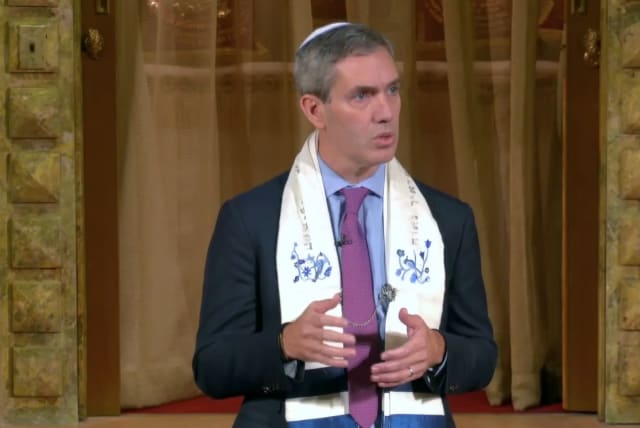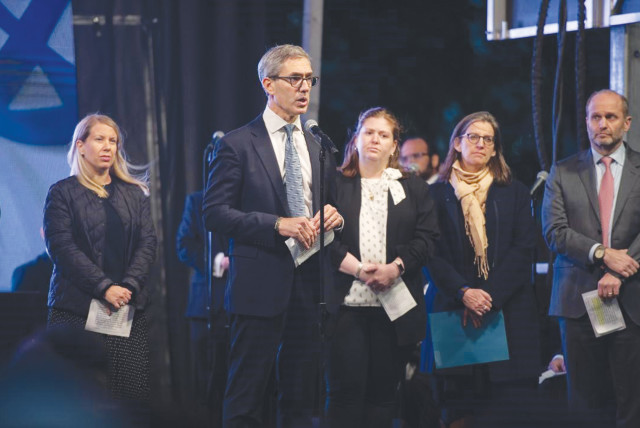Wartime rabbi: Leading American Jewish clergyman takes on a new role

Park Avenue Synagogue Rabbi Elliot Cosgrove has stepped up since October 7 like few others, raising millions for Israel's war and rebuilding efforts and leading the fight against antisemitism.
Like Jewish clergy everywhere, Rabbi Elliot Cosgrove of New York’s Park Avenue Synagogue was ready to exhale after the first week of October, following the serial services, sermons, and monetary appeals around the High Holidays. He describes Simchat Torah, the joyous festival marking the end of the annual cycle of Torah reading, as “the curtain call for the holidays, and usually a time for someone in my profession to decompress.”
Not so this year, when the Hamas attacks on Israel turned the needle in the opposite direction, in the process forcing Rabbi Cosgrove and his American peers into a job few had ever experienced: wartime rabbi. That has meant tending to anxious congregants at home, as well as revving up financial support and advocacy for Israel, and also stepping up the fight against a renewed scourge of antisemitism, much of it flowing from mainstream spigots.
Rabbi Cosgrove, 51, who heads one of America’s largest Conservative synagogues as well as one of the wealthiest, immediately went into action, launching a campaign soliciting donations for the UJA Federation’s Israel Emergency Fund. In the Friday night service following the October 7 assaults, he jolted those in attendance by urging them to pull out their phones for real-time contributions, while directing those livestreaming at home to do the same by scanning the QR code at the bottom of their screens.
“First, I want 100%,” he announced. “Second, I want $18 million” (18 being the Jewish numerical symbol for life). He pulled in the full amount in days – a remarkable haul just two weeks after traditional giving appeals around Yom Kippur. Explaining the unorthodox Shabbat fundraising push to the Jewish Journal, he said, “We are traumatized. But we are not paralyzed.”
In the weeks since, Rabbi Cosgrove has made sure Park Avenue Synagogue (PAS) has stood at the front lines of Jewish activism, adding prayers to its service for safeguarding the Israeli Defense Forces and hostages still being held, and creating a robust Israel at War resource page on its web site (with news links, community messages and youth programs).
It has also hosted a steady lineup of prominent speakers to advance collective discourse around the war, including New York Times columnist Bret Stephens, the Anti-Defamation League’s Jonathan Greenblatt, and Israel’s chief liaison for antisemitism, along with kibbutz residents who lost friends and family from the October 7 incursion. In the second week of November, PAS contributed buses to help transport New Yorkers looking to travel to Washington for the “March for Israel” rally on November 14.
DISCHARGING HIS pastoral duties has been more challenging. Rabbi Cosgrove describes many congregants coming to his office in tears, including parents whose children attend New York’s elite private and public schools.
“Unfortunately, these families are experiencing ethical loneliness in their educational institutions, since they look to their schools not just to provide transmission of information but also critical thinking and moral shaping of souls,” he says.
Careful not to issue blanket condemnation, he nonetheless cites an all too common “betrayal” by school administrators who “either have said the wrong thing, said nothing, or said too little too late about the barbaric acts of October 7.”
The omissions and equivocations fit into Rabbi Cosgrove’s spectrum of antisemitism, which he outlines in three main expressions since the war began. The lowest is the outright Jew-hatred behind Hamas’s murderous rampage, regardless of whether or not those killed were religious or in favor of a two-state solution. The middle strain is the physical and verbal intimidation of Jews – a shove on the street, an insult on social media, or as the rabbi himself experienced, a nasty slur tossed while wearing a yarmulke walking in his Upper East Side neighborhood.
The more pernicious “higher” level of Jew-canceling – by progressives in Congress, Ivy League professors, Hollywood actors, and a UN secretary-general – is to assign blame to Israel for provoking its own attack and the ensuing bloodshed and hostage-taking. Pointing to universities’ free-speech tolerance for “River to the Sea” rallies, Rabbi Cosgrove says, “Had the atrocities of October 7 targeted any other subset of humanity, the response would have been quick, sharp, and unequivocal. The same schools on the front line against misogyny have had trouble calling out rape as a crime against humanity. And the schools that rushed to defend Black lives have fumbled when it comes to defense of Jewish lives. Frankly, the academic impulse to situate October 7 in a wider historical arc betrays an inability to call out evil as evil.”
The links between all three forms of bigotry are ingrained in Jewish memory. “Nazi race theory resulted in the denigration of Jewish lives, which led to the crematoria,” Rabbi Cosgrove says. “It never stops at just one.”
As a parent of four college-age children – “that’s a lot of tuition payments,” he sighs – Rabbi Cosgrove is attuned to the need for more campus support for Jewish students. In early November, while visiting two of his kids attending the University of Michigan, he was invited to present at the school’s Hillel, hoping “to empower students in this moment.”
He describes the layered, sometimes opposing messaging circulating through the quad: “the response of the administration, that of lecturers and professors, as well as the lived experience of students. While the institution may start out with one measured statement, it might not be reflected in the classroom, and then further disconnected from what’s happening in the dorms or around campus, such as tearing down flyers.”
WHILE NOT denying that kids need to parse the narratives and figure out lines of truth for themselves, he puts an extra onus on those running high schools and universities to ensure an open path for dialogue. “It’s their responsibility to foster independent thinking and a safe exchange of ideas. Right now, it appears that environment is not being met at many schools.”
In arming those trying to rebut charges that Israel has acted disproportionately in its bombardment of Gaza, Rabbi Cosgrove calls on Maimonides, the 12th-century sage who advanced a “just war” thesis in the Mishneh Torah.
“Maimonides distinguished between wars of necessity and wars of choice – the former must be undertaken to secure a nation’s defense, and preserve the safety of its citizens,” he explains.
“Based on irrefutable evidence on how this war began, Israel has the right and obligation to defend its people – not to forcefully respond to October 7 is to reward those who would destroy it. Reasonable discussion can follow as to how much and how long the response should be but until every one of the hostages is released, Israel has every right to prosecute the war.”
A multi-layered effort
On a day-to-day basis, Rabbi Cosgrove is helping his members, including a large contingent of Wall Street power players, cope with “a very real sense of Jewish vulnerability for the first time in their lives. Congregants ask whether they should keep a mezuzah on the front door of their walk-up, or if they should change their Jewish-sounding names when reserving an Uber. It’s sad to live in a world where such questions need to be asked, especially in a city as embracing of diverse as New York.”
The rabbi has also engaged with businesses and organizations outside the fold, to challenge and comfort where needed. “Whether on boards, philanthropy, or other advocacy, this is the time to make one’s voice heard,” he says. He praises University of Pennsylvania alum Mark Rowan for not stepping down from Penn’s board over his calls to oust the school’s president for her tacit enabling of anti-Jewish sentiment on campus.
“What I find so inspiring about Marc Rowan,” the rabbi notes, “is that he said it’s exactly because my views are not in alignment with leadership that I am keeping my board position. We should not be abandoning those institutions but rather pushing for change from within.”
RABBI COSGROVE is clear-eyed enough to concede a sizable portion of the playing field to cynics at the margins who will forever disavow Israel’s right to exist – his focus is to try and hold the center. “Sadly, there are those who hate Israel no matter what it does, but I think the long game of acceptance will be won or lost between the 40-yard lines,” he calculates.
“It’s the responsibility of my synagogue and like institutions to mobilize and engage the large portion of those who recognize the right of Jewish self-determination and self-defense, and who can mourn the loss of Jewish and Palestinian lives.”
He recently addressed an anti-antisemitism affinity group at JP Morgan, impressed by the sweep of those joining. “There were 250 Zoom screens open, people from Berlin, London, Jerusalem, New York, and South America, including many non-Jews. They turned out as a global community, to support each other. It was a deeply emotional experience and I received many affirming emails afterward for creating that space.”
If Rabbi Cosgrove has been running on vapors since October 7, it hasn’t shown to those who know him. “Elliot has set the tone for our clergy team,” says fellow Park Avenue Rabbi Neil Zuckerman, who has known his colleague for 25 years.
“We all know this is an unprecedented moment of existential threat to Israel and in fact, Judaism. We’re well aware of what’s at stake. This is the job. We don’t stop to think we’re tired. It’s been a privilege to stand next to Elliot on the bema and watch him lead this community – his voice has been clear, unequivocal and loud.” Rabbi Zuckerman has added stake to events in Israel – his 22-year-old son Jacob is a combat reservist in an IDF tank unit.
Although a bit weary and still looking for that chance to decompress, Rabbi Cosgrove is optimistic about what the war, for all its personal tragedies on both sides, may bring. “One of the sub-narratives is a great awakening of American Jewry. I think you’ll hear a more assertive Jewish voice within secular institutions and see more concerted effort to build relationships with churches, civic organizations, and other like-minded groups. It would be a terrible mistake for Jewish people to circle the wagons. Now is the time to build bridges with other communities.”
The writer runs a press relations firm in New York. He is a member of Park Avenue Synagogue.
Jerusalem Post Store
`; document.getElementById("linkPremium").innerHTML = cont; var divWithLink = document.getElementById("premium-link"); if (divWithLink !== null && divWithLink !== 'undefined') { divWithLink.style.border = "solid 1px #cb0f3e"; divWithLink.style.textAlign = "center"; divWithLink.style.marginBottom = "15px"; divWithLink.style.marginTop = "15px"; divWithLink.style.width = "100%"; divWithLink.style.backgroundColor = "#122952"; divWithLink.style.color = "#ffffff"; divWithLink.style.lineHeight = "1.5"; } } (function (v, i) { });

